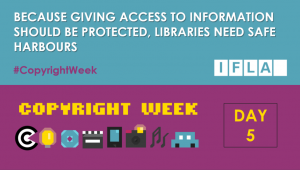
In most of the discussions about either copyright or Internet policy that IFLA attends, the term ‘Internet platform’ is usually code for Google or Facebook. They provide a place where individuals – from writers and creators to propagandists and people uploading large numbers of illicit copies of films – can reach an audience wider than anything imaginable before the Internet. Sometimes through advertising, sometimes through selling data collected, sometimes simply indirectly through reputation or attraction, they gain by this activity.
The idea that some of the wealthiest, and arguably powerful companies in the world should benefit from protection from legal liability when they host – and directly or indirectly benefit from – content that is illegal, is repulsive for many. The voices are loud in favour of shutting down this protection, known as safe harbours. Others suggest that the real ‘villains’ are those uploading the content, and that it is only because Google and Facebook are easier to identify, and richer, that they are targeted.
But Google and Facebook are not the only ‘platforms’ out there. Libraries are also ‘platforms’.
They provide Internet access to millions of individuals – IFLA is already collecting figures on how many institutions are doing this. Indeed, there is evidence that people are readier to look up more sensitive information in libraries than at home sometimes, where they may be subject to supervision by family members. Should they be legally responsible for the activities of their users?
They are supporting innovative learning techniques by creating sharing sites and encouraging users to go from being consumers to producers of information. Libraries run learning hubs, and organise collaboration between academic institutions. They are often behind institutional repositories, a fundamental part of the open access infrastructure. But while researchers claim to respect copyright, large numbers make mistakes when uploading articles to share with colleagues. Should libraries be responsible for this?
They support the creation of community archives, helping often marginalised groups record their own past, and build a sense of identity, often in the face of change or adversity. They collect pictures, testimonies and other materials. Many may be subject to copyright. Should libraries be responsible for accidental infringements?
Whatever the position taken on the liability of the major Internet platforms – IFLA has signed the Manilla Principles of intermediary liability – it is imperative that institutions such as libraries benefit from safe harbours. To remove them would create either unbearable risk, or lead to the restriction or ending of Internet access and use in our institutions. At a time that the Web is becoming ever more indispensable for access to information, this would be a disaster.
See some of the materials created in Australia, where the government has recently proposed to extend safe harbour provisions to libraries. Find out more, too, about IFLA’s work on copyright and libraries.